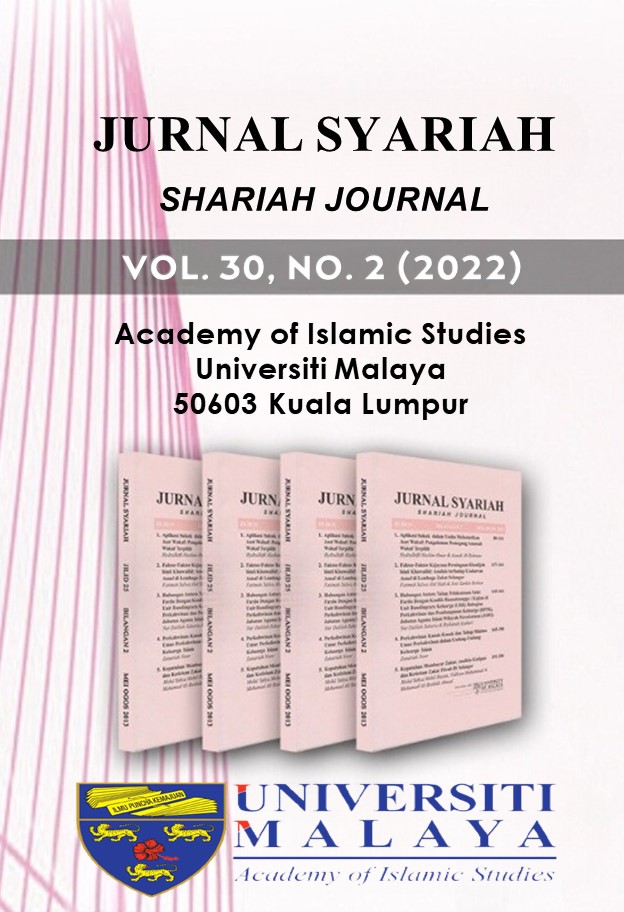A COMPARATIVE ANALYSIS BETWEEN THE CUSTOMARY AND ISLAMIC LAWS OF INTESTATE SUCCESSION WITH REGARD TO DISCRIMINATION: A SOUTH AFRICAN CONSTITUTIONAL LAW CASE STUDY
DOI:
https://doi.org/10.22452/syariah.vol30no2.2Keywords:
Islamic law of succession, South African law of succession, South African constitution, equality, discriminationAbstract
The law rule of male primogeniture (customary law of succession) was found to be unconstitutional in Bhe and Others v The Magistrate Khayelitsha and Others (Bhe) based on it unfairly discriminating against females. The Constitutional Court held that the rule of male primogeniture was inconsistent with the Constitution and invalid to the extent that it ‘excludes or hinders women … from inheriting property.’ Muslims have been living in South Africa for over 300 years. These persons are required in terms of their religion to follow Islamic law. There has (to date) been no legislation enacted by the South African government that gives effect to the Islamic law of succession. A Muslim daughter could argue that the Islamic law of intestate succession per se discriminates against females, as a Muslim son would always inherit double the share of a Muslim daughter. This article compares the position of females in terms of the customary and Islamic laws of intestate succession. An overview of the South African law of intestate succession is provided by way of introduction. This is followed by examining certain South African intestate succession law court cases where discriminatory provisions were challenged. The 2:1 rule as found within the Islamic law of intestate succession per se is then investigated. The article then examines the constitutionality of the 2:1 rule as found within the Islamic law of intestate succession per se based on the same constitutional principles applied in the Bhe judgment where the constitutionality of the rule of male primogeniture was investigated. The article concludes with an analysis of the findings and a recommendation.
Downloads
References
‘Abd al-Raḥmān al-Jazirī, Kitāb al-Fiqh ‘alā Madhāhib al-Arba‘ah (Bayrūt: Dār al-Fikr, 2000).
Abduroaf M, ‘A Constitutional Analysis of An Islamic Will Within The South African Context’, De Jure Law Journal 52, no. 1 (2019): 257-266, http://www.scielo.org.za/scielo.php?script=sci_arttext&pid=S2225-71602019000100016, accessed on 10 May 2023.
Abduroaf M, ‘An Analysis of The Rationale Behind The Distribution of Shares In Terms of The Islamic Law of Intestate Succession’, De Jure Law Journal 53, no. 1 (2020): 115-122, http://www.scielo.org.za/scielo.php?script=sci_arttext&pid=S2225-71602020000100008&lng=en&nrm=iso&tlng=en, accessed on 10 May 2023.
Constitution of the Republic of South Africa (1996).
Currie Ian & Johan De Waal, The Bill of Rights Handbook (Claremont: Juta and Company Ltd., 2013)
Daniels v Campbell NO & Others, 2004 (5) SA 331 (CC), http://www.saflii.org/za/cases/ZACC/2004/14.html, accessed on 10 May 2023.
Dār al-Iftā’al-Miṣriyyah, ‘Do Women Take Unequal Shares of Inheritance in Islam?’, http://eng.dar-alifta.org/foreign/ViewArticle.aspx?ID=120&, accessed on 28 November 2017.
Hilali MT and Khan MM, The Noble Qur’an - English Translation of the Meanings and Commentary (Madinah: King Fahad Complex for the Printing of the Holy Quraan, 1404H).
Khan MM, The Translation of the Meanings of Sahih al-Bukhari (al-Madīnah al-Munawwarah: Dār al-Fikr, 2004).
Mahida, Ebrahim Mahomed, History of Muslims in South Africa: A Chronology (Durban: Arabic Study Circle, 1993).
Muslim Marriages Bill, Government Notice 37 in Government Gazette 33946 of 21 January 2011, https://www.gov.za/sites/default/files/gcis_document/201409/33946gen37.pdf, accessed on 26 October 2017.
Muṣṭafā al-Sibā’ī, Sharḥ al-Qānūn al-Aḥwāl al-Shakhṣiyyah 7ed, vol. 2 (Bayrūt: Dār al-Warrāq, 2000).
O'Regan, Sachs, & Van der Westhuizen Skweyiya, ‘Bhe and Others v Magistrate Khayelitsha and Others’, 2005 (1) SA 580 (CC), http://www.saflii.org/za/cases/ZACC/2004/17.html, accessed on 10 May 2023.
Rautenbach C, ‘Introduction’ in The Law of Succession in South Africa, ed. Juanita Jamneck & Christa Rautenbach (Cape Town: Oxford, 2009).
Ryland v Edros 1997 (2) SA 690 (C).
Downloads
Published
How to Cite
Issue
Section
License
Copyright (c) 2023 Jurnal Syariah

This work is licensed under a Creative Commons Attribution-NonCommercial 4.0 International License.
COPYRIGHT: All rights reserved. Not allowed to be reproduced any part of articles and contents of this journal in any form or by any way, whether electronic, mechanical, photocopying, recording or otherwise without permission in writing from the Chief Editor, Jurnal Syariah.











